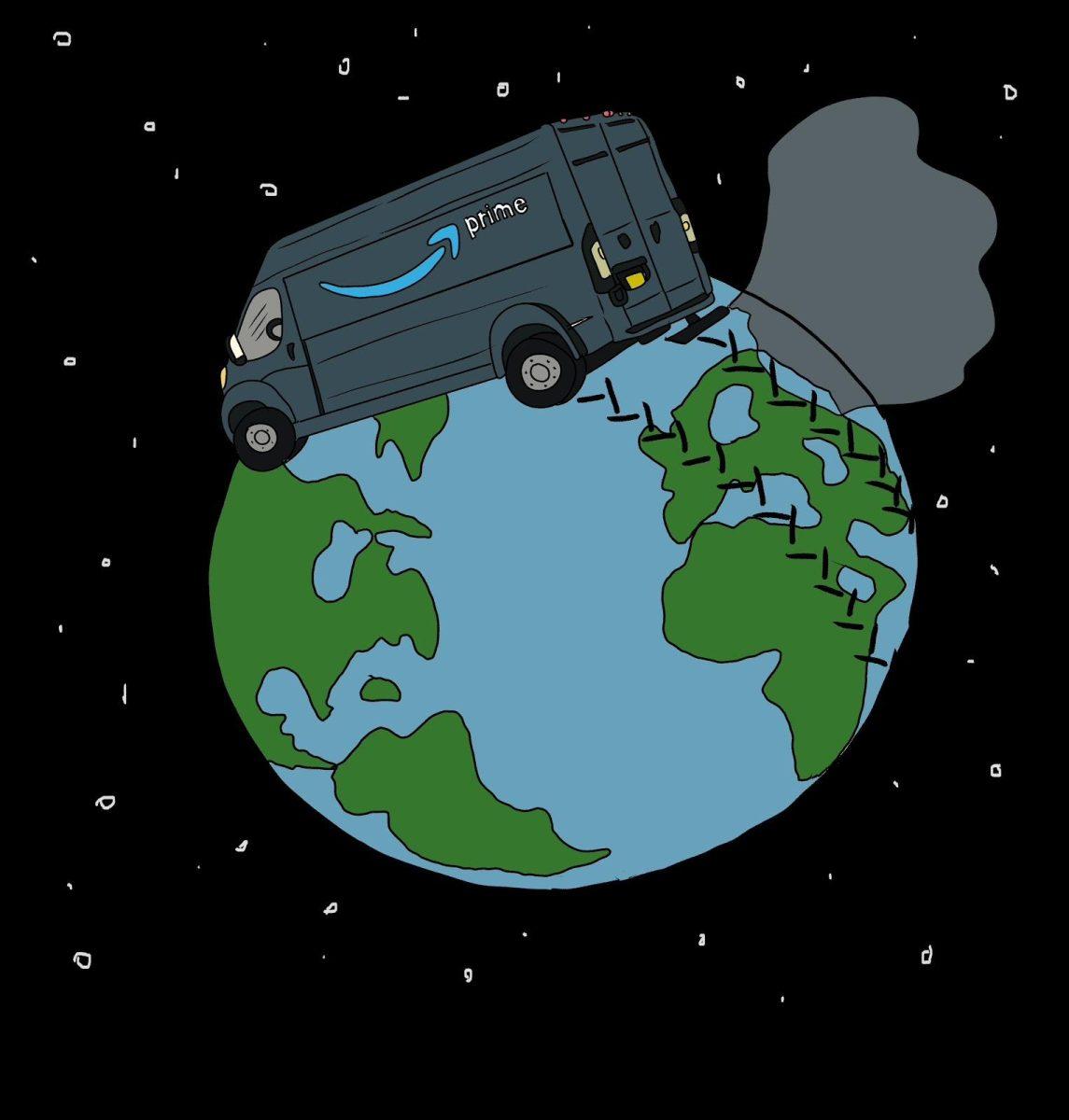
Photo by: Bijou Allard
With COVID-19 making it harder to leave the house, small local businesses have been struggling while online shopping giant Amazon has been gaining business. Although Amazon can easily pull you in with their good deals and their fast shipping, I can promise you that there are better options out there. As amazing as Amazon looks on the outside, you would be surprised by the secrets this multi-billion dollar corporation has to hide.
Exploitation of workers:
Amazon is a company that has many downfalls, one of them being the way they treat their employees. Despite being such a large and well-known company, Amazon fails to provide their employees with a good working wage and benefits. As of September, Amazon has employed over 100,000 workers. The jobs Amazon employees are given are varied, ranging from warehouse workers and delivery drivers to package sorters. But no matter what job an employee has, they will be treated as if they were a robot. As Amazon becomes many people’s first choice while shopping online, workers are becoming machines. Behind every online purchase, Amazon employees are struggling trying to get the order right. Amazon workers are also overworked. According to OneZero, workers in the warehouse had to change their shoes after just two days due to how much they are on their feet. Workers also have insanely high expectations. Ryan Fan wrote, “the goal was to pick 350 units per hour and have a takt time of seven seconds,” and if they were too slow, they would have to talk to the managers. Most Amazon employees have limited to no health insurance, according to Vice magazine, and with the times we are in right now, that just adds to the stress. With the spread of COVID and the growth of Amazon, New York City’s largest warehouse reported their first outbreak in mid March. According to Vice, “workers fell ill with COVID-19, employees were sent out of the premises, the factory was then sprayed, and three hours later it was business as usual.” This example provides proof that Amazon values profit over their employees’ well-being, and demonstrates a large problem within the company.
Impact on our climate:
Amazon, a company that has a large ecological footprint, has recently been attempting to spread the word that they take climate change seriously. Jeff Bezos came out with a new plan in 2019 to combat climate change. This new policy brings many changes. By 2030, Amazon wants to reach 100% renewable energy, and by 2040 they aim to have a net zero carbon emission. Along with that, they have also announced that they will be investing in electric vehicles and carbon offset projects. Although these are major positives, it’s hard to tell how significant these changes are going to be without knowing all of Amazon’s climate impacts. Amazon’s trucks are run on diesel, which is more fuel efficient compared to gasoline, but it produces four times the amount of nitrogen dioxide and 22 more particles then Petrol. Amazon’s packaging methods don’t help either. It came as no surprise to many when research showed that Amazon used more than 116 million pounds of plastic packaging in 2019. With Amazon growing and getting more customers, it is safe to assume that the percent of plastic waste has increased over the last year. With the insanely high number of plastic waste now entering our ecosystems, it is affecting us, and the planet, more than we know.
Wealth gap:
When supporting Amazon, you are contributing to the impact of the wealth gap. The wealth gap is an idea that a select group of people, (one being Amazon CEOJeff Bezos), holds the majority of the money in the world. People in this select circle have the power to distribute their money to those who might need it. Instead of doing so, though, they keep it for themselves, due to the power that comes with having money. Jeff Bezos is on track to be the first trillionaire, and is a prime example of the wealth gap. Although he chooses to donate his money, It’s not nearly enough compared to how much he makes. When we buy from Amazon, money goes straight into his pockets and potentially will never come out.
Hurts small and local business:
When choosing to shop from big corporations like Amazon, it takes business away from the smaller, local businesses that are struggling to keep their doors open. Due to COVID-19, people have been much more likely to choose to do all their shopping online, but small businesses need your support more than ever. Many small and local businesses put their whole life into their business and rely on customers like us to buy their products in order to pay their bills, put food on the table for their family, and continue their passion. Jo Brody, a local SE Portland artist that sells her work, is one example of a small business owner who’s had to make a lot of adjustments to the way she earns income this year. For 17 years she held an art sale the first week of December with nearly 1000 attendants who came by to see and buy her beautiful pieces of jewelry. Sadly, this year she was unable to do that, which made it a lot more difficult for her to get the same amount of business as she did in years past. She ended up doing a “porch show” where people could make 20 minute appointments to come browse her artwork. Brody’s story is one that nearly every local business owner can relate to. Most local businesses are trying to figure out a way to stay open and continue to make money. There are a lot of uncertainties,but the one thing they know is that they appreciate all of the support they can get. Companies like Amazon are certainly not helping local businesses get the support that they need right now. Thankfully, many high school students recognize the harms that Amazon brings and are beginning to change the way they shop. Sophomore Addison Jenson has taken initiative this holiday season and decided to boycott Amazon as a whole. She explained that her mom was planning on cancelling their prime membership, which includes free fast shipping for eligible purchases, streaming of movies, TV shows and music, exclusive shopping deals and selection, unlimited reading, and more. “A membership is just unnecessary if you aren’t constantly shopping or watching stuff on prime, and it’s too expensive.” She then continued to say that for her lifestyle, shopping smaller business made more sense. When doing her holiday shopping, Jenson noticed how much she preferred shopping locally. She felt as if there was more of a meaning to her gifts and that she could tell that she wasn’t getting “cheap off brand products.”
Shop small and locally:
One thing I have come to realize is almost everything that you want to buy off of Amazon you can find somewhere else. It is truly fascinating how many options are out there; sometimes you just have to do a little research. One of my favorite places to shop online is Etsy. Etsy runs similar to Amazon, except that everything on the site is made with care from a small business. From my experience, every seller I have bought from via Etsy has been so nice. Some write thank you notes with your order, while some even give you a free gift. When I shop small and local I always feel so much serotonin. The fact that I know I’m supporting someone or something I care about makes it so worth it. At the end of the day, it’s up to us to make a change.


































